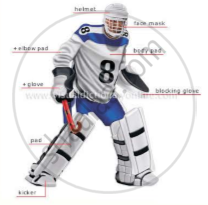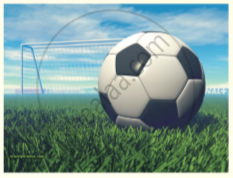Advertisements
Advertisements
Question
Read the following.
A group of children in your class are going to live in a hostel.
•They have been asked to choose a person in the group to share a room with.
•They are asking each other questions to decide who they would like to share a room with. Ask one another questions about likes/dislikes/preferences/hobbies/personal characteristics.
Use the following questions and sentence openings.
(i) What do you enjoy doing after school?
I enjoy...
(ii) What do you like in general?
I like...
(iii) Do you play any game?
I don’t like...
(iv) Would you mind if I listened to music after dinner?
I wouldn’t...
(v) Will it be all right if I...?
It’s fine with me...
(vi) Is there anything you dislike, particularly? Well, I can’t share...
(vii) Do you like to attend parties?
Oh, I...
(viii) Would you say you are...?
I think...
Solution
1. I enjoy watching TV
2. I like playing video games in general
3. I don’t like playing outdoor games. I play indoor games like ludo and carom.
4. I wouldn’t because I love music
5. It’s fine with me if you switch on the light, you can switch on the light whenever you want
6. Well, I can’t share my pillow with anyone
7. Oh, I love going to parties
8. I think I am a creative person, yes, I am creative.
APPEARS IN
RELATED QUESTIONS
Can you think of some other ending for the story?
Look at the following sentences. They each have two clauses, or two parts each with their own subject and verb or verb phrase. Often, one part (italicised) tells us when or why something happened.
• I reached the market when most of the shops had closed. (Tells us when I reached.)
• When Rahul Dravid walked back towards the pavilion, everyone stood up. (Tells us when everyone stood up.)
• The telephone rang and Ganga picked it up. (Tells us what happened next.)
• Gunjan has been with us ever since the school began. (Tells us for how long he has been with us.)
I. Identify the two parts in the sentences below by underlining the part that gives us the information in brackets.
1. Where other girls wore traditional Indian dresses, Santosh preferred shorts.
(Contrasts her dress with that of others)
2. She left home and got herself enrolled in a school in Delhi. (Tells us what happened after the first action.)
3. She decided to fight the system when the right moment arrived. (Tells us when she was going to fight the system.)
4. Little Maria had not yet celebrated her tenth birthday when she was packed off to train in the United States. (Tells us when Maria was sent to the U.S.)
Form pairs - one student will read the text for 'Hockey', and the second student will read the text for 'Football'.
Hockey

The game starts when the umpire blows his whistle for the opening pass-back. The passback is made at the centre of the field to start the game (also after half- time and after each goal is scored). The ball, which may be pushed or hit, must not be directed over the centre line. All players of the opposing team must stand at least 5 yard from the ball and all players of both teams, other than the player making the pass-back must be in their own half of the field.
There are two umpires to control the game and to administer the rules. These umpires are the sole judges of the game. The umpires are responsible for keeping time for the duration of the game.


In front of each goal is an area known as the penalty area. This is a rectangular area, 40.2m wide and extending 16. Sm into the field where the goalkeeper operates.
A standard adult football match consists of two periods of 45 minutes each, known as halves. Each half runs continuously, meaning that the clock is not stopped when the ball is out of play. There is usually a 15-minute half-time break between halves. The end of the match is known as full-time. Anytime during the match, a team can substitute upto three players maximum.
The game is controlled by a referee who is the official timekeeper for the match, and may make an allowance for time lost through substitutions, injured players requiring attention, or other stoppages. There are also two linesmen who keep guard of the touchlines or sidelines, signalling when the ball crosses the boundary lines. The referee alone signals the end of the match.
Handling the ball deliberately, pushing or tripping an opponent, or hitting a player from behind are examples of fouls, punishable by a direct free kick or penalty kick depending on where the offence occurred. Other fouls are punishable by an indirect free kick.
The referee may punish a player's or substitute's misconduct by a caution (yellow card) or sending-off (red card). A player is given a yellow card is said to have been 'booked'.
• Red - Serious misconduct resulting in ejection from the game. If a player has been sent off, no substitute can be brought in his place.
What does he plant who plants a tree?
He plants cool shade and tender rain,
And seed and bud of days to be,
And years that fade and flush again;
He plants the glory of the plain;
He plants the forest's heritage;
The harvest of a coming age;
The joy that unborn eyes shall see___
These things he plants who plants a tree.
Read the lines given above and answer the question that follow:
Who is being referred to as the unborn eyes?
Unleashing the goats from the drumstick tree, Muni started out, driving them ahead and uttering weird cries from time to time in order to urge them on. Me passed through the village with his head bowed in thought. He did not want to look at anyone or be accosted. A couple of cronies lounging in the temple corridor hailed him, but he ignored their call. They had known him in the days of affluence when he lorded over a flock of fleecy sheep, not the miserable grawky goats that he had today.
Read the extract given below and answer the question that follow.
How had Muni lost the animals?
I was in for a surprise. When the time came for the broad-jump trials, I was startled to see a tall boy hitting the pit at almost 26 feet on his practice leaps! He turned out to be a German named Luz Long. 1 was told that Hitler hoped to win the jump with him. I guessed that if Long won, it would add some new support to the Nazis’ “master race” (Aryan superiority) theory. After all, I am a Negro. Angr about Hitler’s ways, 1 determined to go out there and really show Der Fuhrer and his master race who was superior and who wasn’t. An angry athlete is an athlete who will make mistakes, as any coach will tell you. I was no exception. On the first of my three qualifying jumps, I leaped from several inches beyond the takeoff board for a foul. On the second jump, I fouled even worse. “Did I come 3,000 miles for this?” I thought bitterly. “To foul out of the trials and make a fool of myself ?” Walking a few yards from the pit, 1 kicked disgustedly at the dirt.
Read the extract given below and answer the question that follow.
Why did Owens become hot under the collar before the trials?
Read the extract given below and answer the questions that follow:
Bassanio: To You, Antonio,
I owe the most, in money and in love;
And from your love, I have a warranty
To unburden all my plots and purposes
How to get clear of all the debts I owe.
Antonio: I pray you, good Bassanio, let me know it;
(i) Describe Antonio's mood at the beginning of this scene.
State any two reasons that Antonio's friends, who · were present, gave to explain his mood.
(ii) What promise did Antonio make to Bassanio immediately after this conversation?
(iii) What did Bassanio say to Antonio about 'a lady richly left' in Belmont?
(iv) Why was Antonio unable to lend Bassanio the ·money that he needed?
(v) What does the above extract reveal of the relationship between Antonio and Bassanio?
Mention' one way in which this relationship was put to the test later in the play.
Write ‘True’ or ‘False’ against each of the following statements.
(i) Timothy and Grandfather went to Lucknow in a special compartment.
(ii) The compartment in which Grandfather and Timothy travelled had no other passenger.
(iii) Timothy and Grandfather travelled in a first-class compartment.
(vi) All passengers in the compartment thought that Timothy was a well-fed and civilized tiger.
The following sentences has two blanks. Fill in the blanks with appropriate forms of the word given in brackets.
I didn’t notice any serious_________ of opinion among the debaters, although they_________ from one another over small points. (differ)
How did Mr Gessler described his brother?
We should be friendly towards our neighbours. Why so?
What do you know about worker ants?
Why do you think he had come to the shop?
In what way is Pambupatti different from any other village?
Fans don’t talk, but it is possible to imagine that they do. What is it, then, that sounds like the fan’s chatter?
Multiple Choice Question:
Who is the poet of this poem?
What did Beam’s school aim to teach? Why?
With your partner, complete the following sentence in your own word using the ideas in the poem.
Words are the __________________ of thought.
Encircle the correct article.
I’d like (a/an/the) apple, please.
